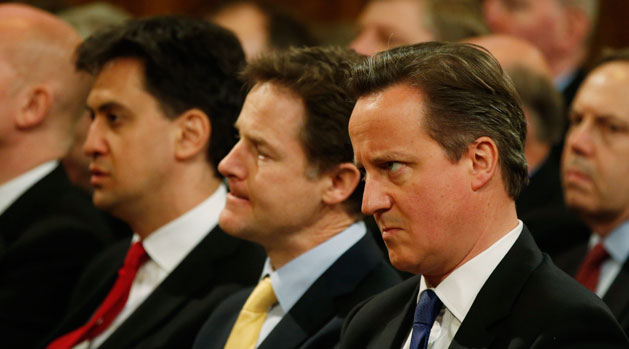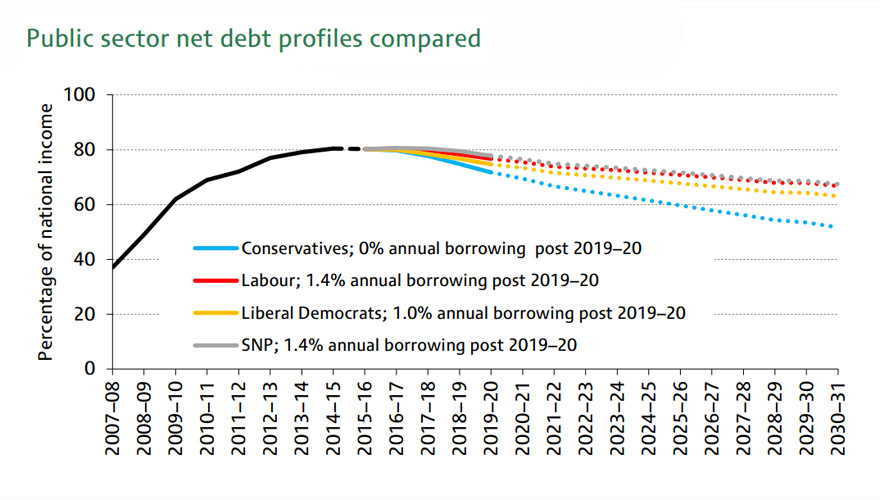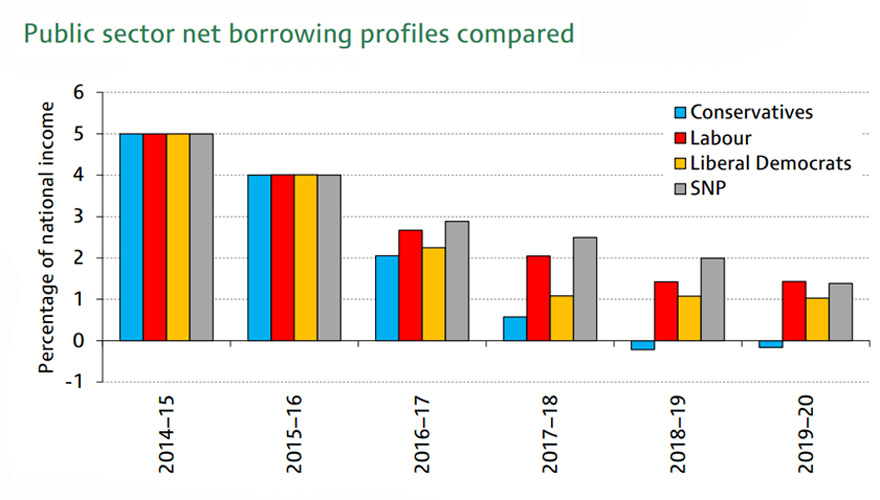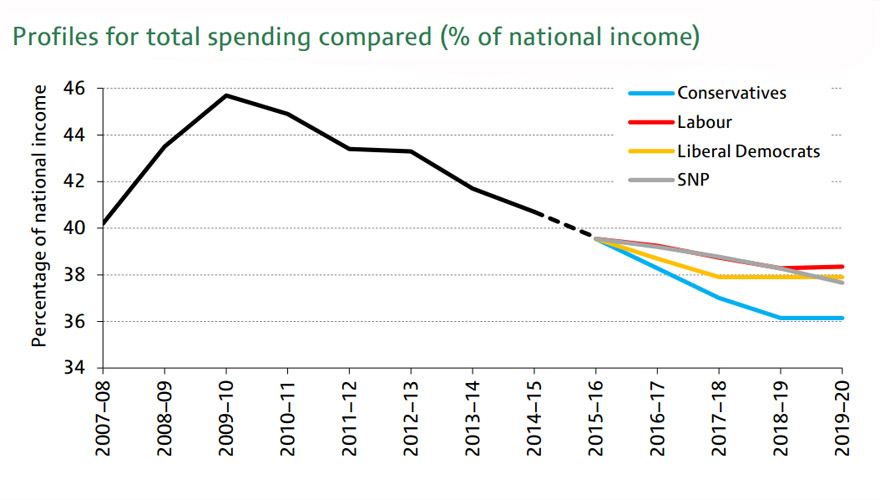Election 2015: how the IFS rates each party's policies
Institute for Fiscal Studies accuses four main parties of failing to inform voters of their plans for the country

A free daily email with the biggest news stories of the day – and the best features from TheWeek.com
You are now subscribed
Your newsletter sign-up was successful
The electorate has been given an "incomplete picture" of what they can expect from the four main political parties after the general election, the Institute for Fiscal Studies has said.
After analysing the public finance plans of the Conservatives, Liberal Democrats, Labour and the Scottish National Party, the IFS said all of the parties "could have done better" at explaining their fiscal ambitions to the public.
All four parties' plans imply further austerity over the next parliament, says the IFS – even SNP, which has promised to demand an "end to austerity" in its manifesto. Nevertheless, the difference in plans between the Conservatives and the SNP are described as "substantial".
The Week
Escape your echo chamber. Get the facts behind the news, plus analysis from multiple perspectives.

Sign up for The Week's Free Newsletters
From our morning news briefing to a weekly Good News Newsletter, get the best of The Week delivered directly to your inbox.
From our morning news briefing to a weekly Good News Newsletter, get the best of The Week delivered directly to your inbox.
All four have also said they will reduce borrowing, but none of them have managed to be "completely specific" about how much they want to reduce it by or how they plan to do it. The IFS has therefore had to make some assumptions about each party's aims based on other policies and pledges published.
Borrowing has reduced from a peak of 10.2 per cent of national income in 2009/10 to five per cent in 2014/15, said the IFS, but "whoever forms the next government still faces the task of finishing the job of reducing borrowing back to sustainable levels".
Here are the four parties' plans to achieve this:



Conservatives
A free daily email with the biggest news stories of the day – and the best features from TheWeek.com
Debt: As a share of national income, debt could be reduced from 80 per cent in 2014/15 to 72 per cent by 2019/20 under the Conservatives. This is more than all of the other three parties.
Borrowing: The Conservatives' tax and spending plans imply a reduction in borrowing from five per cent of national income in 2014/15 to a surplus of 0.2 per cent from 2018/19. This marks a 5.2 per cent reduction.
Public spending: Spending as a share of national income could be cut by 4.6 per cent by 2019/20, taking spending back to around the same share of national income as last seen in 2000/01.
How would they do it?
The Conservatives "need to spell out substantially more detail of how they will deliver the overall fiscal targets they have set themselves", says the IFS. Despite offering tax giveaways and protection for aid, NHS and education spending, the Tories plan to raise money through a tax avoidance crackdown and cuts to benefits.
Total departmental spending would therefore need to be cut by 7.1 per cent between 2014/15 and 2018/19. This is a slightly slower rate compared to the previous parliament but it would mean that unprotected departments – such as defence, transport, law and order, and social care – could face a further 17.9 per cent cuts over the next three years on top of the 18.1 per cent cuts experienced over the last five years.
Labour
Debt: As a share of national income, debt could be reduced from 80 per cent to 77 per cent by 2019/20 under Labour. This would amount to about £90bn more debt under a Labour government than under a Tory government by the end of the next parliament.
Borrowing: The party's "vague" ambition to "balance the current budget" implies a 3.6 per cent reduction by 2018/19, bringing it to 1.4 per cent of national income.
Public spending: Spending as a share of national income could be cut by 2.4 per cent by 2019/20, the smallest reduction of all the parties.
How would they do it?
Labour might need only "relatively small cuts" to departments (other than the protected areas of aid, NHS and education) on top of the cuts already in place for 2015/16 to achieve its aims. However, IFS notes that the party's pledge to "get a surplus on the current budget" is "vague". The Labour Party has also provided "disappointingly little" information on exactly how much they would borrow if they were in government after the next election.
Liberal Democrats
Debt: As a share of national income, debt could be reduced from 80 per cent to 75 per cent by 2019/20 under the Lib Dems.
Borrowing: The Liberal Democrats have said they are aiming for a borrowing reduction of 3.9 per cent by 2017/18 (rather than 2018/19).
Public spending: Spending as a share of national income could be cut by 2.8 per cent by 2019/20.
How would they do it?
The Liberal Democrats are positioning themselves between Labour and the Conservatives, but have "failed to spell out details of how they would achieve much of their tightening". The party claims it can raise £10bn from reducing tax avoidance and evasion by the end of parliament – twice as much as the Conservatives and a third more than Labour. They are also relying on £12bn of cuts to departmental spending.
SNP
Debt: As a share of national income, debt could be reduced from 80 per cent to 78 per cent by 2019/20 under SNP.
Borrowing: The SNP's tax and spending plans imply a borrowing reduction of 3.6 per cent of national income, but this would not be completed until 2019/20 (rather than 2018/19).
Public spending: Spending as a share of national income could be cut by 3.1 per cent by 2019/20.
How would they do it?
The SNP's stated plans "do not necessarily match their anti-austerity rhetoric", says the IFS. Its manifesto implies that the party would actually oversee a bigger cut to spending by 2019/20 than Labour. It will cut less to begin with, but the period of austerity would be longer than the other three parties. The party's tax take-aways offsets its tax giveaways, while benefits would increase. Therefore, total departmental spending in real terms would be broadly frozen between 2014/15 and 2019/20. The IFS says this would mean departmental spending outside of the NHS and aid could therefore face cuts of 4.3 per cent.